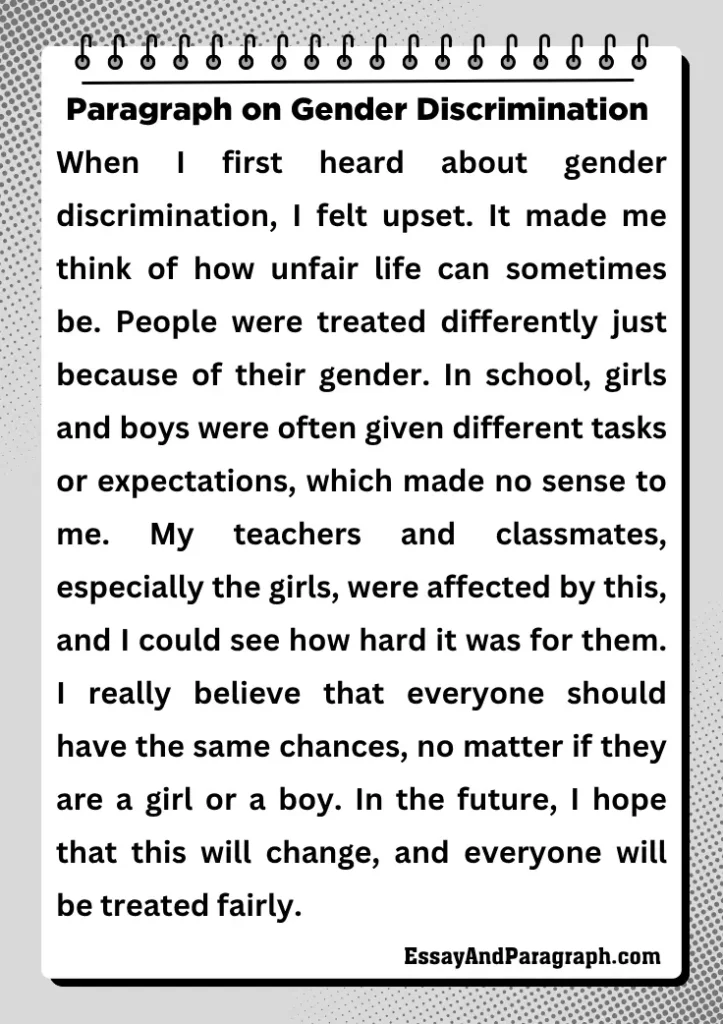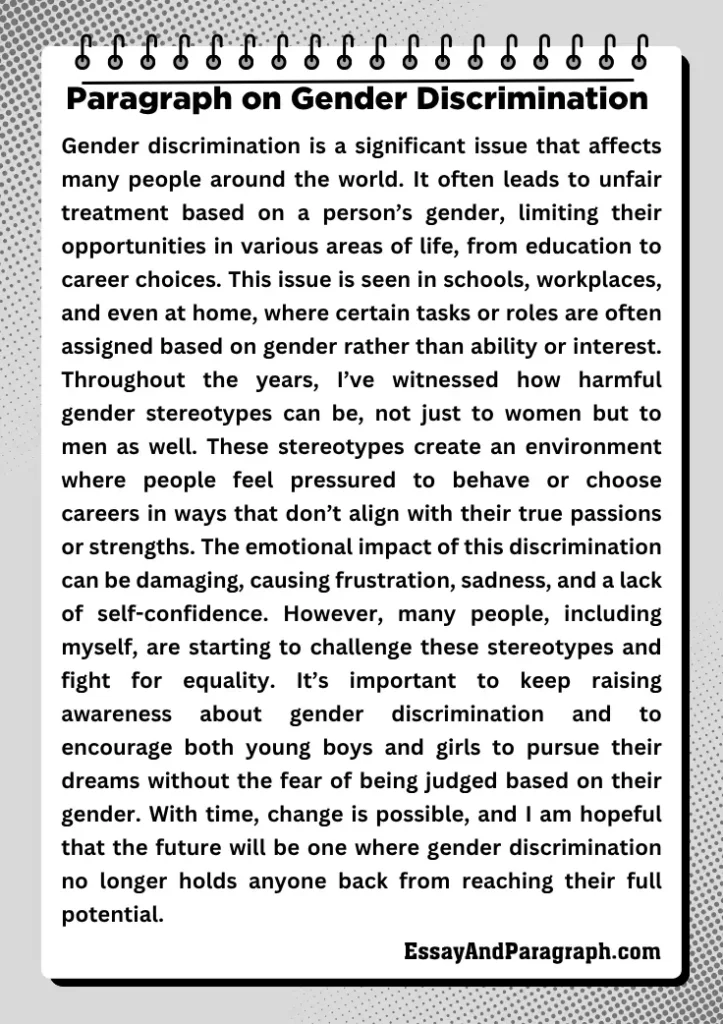Gender discrimination is a topic that can evoke a lot of emotions. It’s something that, unfortunately, many people face in their lives. But don’t worry, we’re going to talk about this subject in a simple and understandable way. In this article, we’ll learn how to write paragraphs on gender discrimination in different lengths, from 100 words all the way up to 300 words. Whether you’re writing for school or just curious, you’ll find helpful tips here to make your writing clear and thoughtful. Let’s dive into this important subject and explore how we can talk about gender discrimination more effectively.
Paragraph on Gender Discrimination (100 words)
When I first heard about gender discrimination, I felt upset. It made me think of how unfair life can sometimes be. People were treated differently just because of their gender. In school, girls and boys were often given different tasks or expectations, which made no sense to me. My teachers and classmates, especially the girls, were affected by this, and I could see how hard it was for them. I really believe that everyone should have the same chances, no matter if they are a girl or a boy. In the future, I hope that this will change, and everyone will be treated fairly.
 Paragraph on Gender Discrimination
Paragraph on Gender Discrimination
Paragraph on Gender Discrimination (150 words)
Gender discrimination always made me feel uncomfortable. I saw it happening in my school, where boys and girls were expected to do different things. Girls were often told to clean up or help with the younger kids, while boys were asked to lead the sports activities. This made me think about how unfair it was. My friends, both girls and boys, didn’t like this either. I remember one time when a teacher told a girl she couldn’t play a game because it was for boys only. That made everyone angry. The outcome was that we all learned how important it is to stand up against gender discrimination. Now, I believe things are changing, and I expect that in the future, all children will have equal opportunities in every part of their lives, whether it’s at school, work, or play.
Paragraph on Gender Discrimination (200 words)
When I first understood gender discrimination, it felt like a punch in the stomach. How could someone treat another person unfairly just because of their gender? It made me sad to see how girls and boys were treated differently, even at a young age. For example, in school, boys were often encouraged to be strong and assertive, while girls were expected to be quiet and calm. I noticed this in how our teachers would praise boys for being loud and confident but would tell girls to “calm down” or “be more ladylike.” The worst part was seeing some of my classmates feel less confident because they were told that they couldn’t do something just because they were girls. The most important thing I learned is that we all deserve the same opportunities, no matter our gender. I saw how hard my female friends worked to break these stereotypes, and it was inspiring. Going forward, I hope that we, as a society, can keep fighting for equal rights. I believe that by standing together and supporting one another, we can create a world where gender discrimination no longer exists.
Paragraph on Gender Discrimination (250 words)
Gender discrimination has always been something that bothered me deeply. Growing up, I saw many examples of how boys and girls were treated differently, and it didn’t feel right. It was more than just small actions; it was the way people were expected to behave because of their gender. For instance, in my community, girls were expected to help with cooking and cleaning, while boys were encouraged to play sports or work outside. Even in school, girls were often told that certain subjects, like math and science, were “for boys,” and boys were sometimes discouraged from taking care of younger children or helping in the kitchen. This made me realize how damaging gender roles could be. I saw how frustrated my friends became when they weren’t given the same chances to explore their interests. I think one of the most important moments in my life was when my best friend, a girl, won a science fair but still didn’t get the same recognition that a boy would have. This made me realize how important it is to raise awareness about gender discrimination. I believe that everyone, regardless of gender, should have the right to do what they love without fear of judgment. As we move forward, I hope we can continue to teach younger generations the importance of gender equality. It’s time for society to change for the better, and I’m optimistic that we can all play a part in making this happen.
Paragraph on Gender Discrimination (300 words)
The topic of gender discrimination has always been something close to my heart. From a young age, I noticed that girls and boys were treated differently, and it didn’t sit right with me. I saw it most clearly in the activities we did at school and at home. Boys were usually encouraged to pursue careers in science, technology, or sports, while girls were often pushed toward arts, literature, and domestic duties. I remember feeling frustrated as I watched my female classmates excel in science but get fewer opportunities to showcase their talents compared to their male counterparts. One event that stood out to me was when a female student in our class was praised for her artistic talent, but her ideas in science were often ignored. Meanwhile, the boys were always given extra attention and opportunities. As I got older, I began to understand that gender discrimination wasn’t just about physical activities or career choices—it was about the way society viewed and valued people based on their gender. I became more aware of how damaging these gender stereotypes could be to everyone, including men, who were often expected to behave in a certain way. Seeing this made me want to take action. I started talking to my friends about how we could help challenge these stereotypes and support each other in all areas of life. The result of these conversations was that we became more open-minded and willing to stand up for equality. Going forward, I believe that things are changing, and I’m hopeful for a future where gender discrimination no longer exists. It will take time and effort, but with awareness and support, we can make it happen.
FAQs on Paragraph on Gender Discrimination
Q1: What is gender discrimination?
Gender discrimination is when someone is treated unfairly because of their gender. This can happen in many areas of life, like at school, work, or even at home. It means that a person might not get the same chances or opportunities as others just because they are a girl or a boy.
Q2: How can gender discrimination affect people?
Gender discrimination can hurt people emotionally and mentally. When someone is not treated equally because of their gender, they may feel sad, frustrated, or like they’re not good enough. It can also limit their opportunities, making it harder for them to achieve their dreams.
Q3: What are some examples of gender discrimination?
An example of gender discrimination could be when girls are told not to play sports because it’s “for boys,” or when boys are discouraged from expressing their emotions because it’s seen as “weak.” These actions show that certain behaviors are expected only from one gender, which is unfair.
Q4: What can we do to stop gender discrimination?
The best way to stop gender discrimination is to speak up when we see it happening. We should teach others about the importance of equality and respect, and make sure everyone has the same opportunities, no matter their gender.
Q5: Is gender discrimination still common today?
Yes, gender discrimination is still a problem in many parts of the world. However, people are starting to recognize it more and are working hard to make changes. It may take time, but with awareness and action, we can reduce gender discrimination and create a more equal society for everyone.
Q6: How can gender discrimination affect education?
Gender discrimination in education can prevent students from pursuing subjects or activities they’re passionate about. For example, girls may be steered away from science and math, while boys may be discouraged from pursuing the arts. This limits their growth and the chance to explore their full potential.
 Paragraph on Gender Discrimination
Paragraph on Gender Discrimination
Summary on Paragraph on Gender Discrimination
Gender discrimination is a significant issue that affects many people around the world. It often leads to unfair treatment based on a person’s gender, limiting their opportunities in various areas of life, from education to career choices. This issue is seen in schools, workplaces, and even at home, where certain tasks or roles are often assigned based on gender rather than ability or interest. Throughout the years, I’ve witnessed how harmful gender stereotypes can be, not just to women but to men as well. These stereotypes create an environment where people feel pressured to behave or choose careers in ways that don’t align with their true passions or strengths. The emotional impact of this discrimination can be damaging, causing frustration, sadness, and a lack of self-confidence. However, many people, including myself, are starting to challenge these stereotypes and fight for equality. It’s important to keep raising awareness about gender discrimination and to encourage both young boys and girls to pursue their dreams without the fear of being judged based on their gender. With time, change is possible, and I am hopeful that the future will be one where gender discrimination no longer holds anyone back from reaching their full potential.










